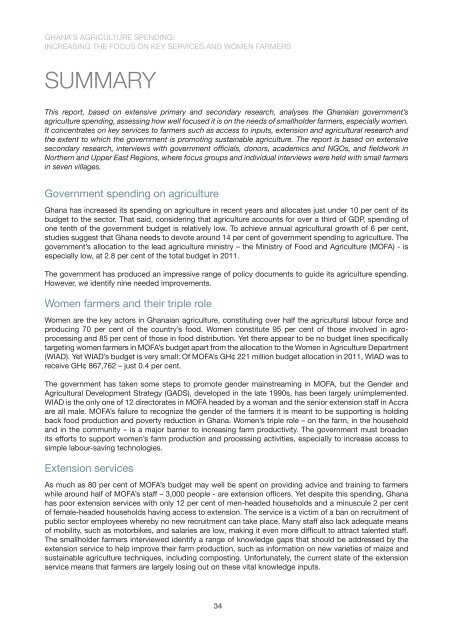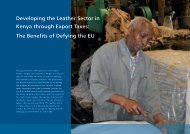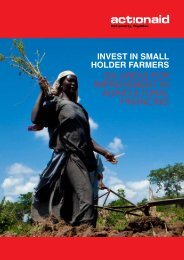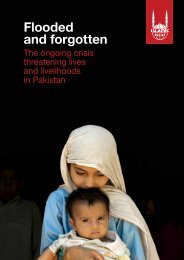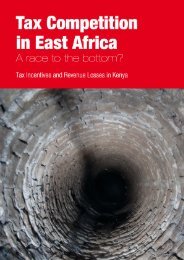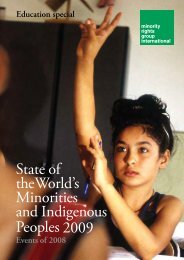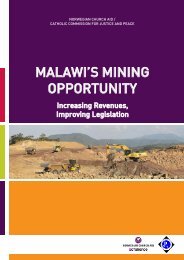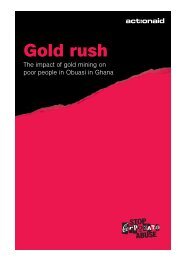IMPROVING AFRICAN AGRICULTURE SPENDING ... - Africa Adapt
IMPROVING AFRICAN AGRICULTURE SPENDING ... - Africa Adapt
IMPROVING AFRICAN AGRICULTURE SPENDING ... - Africa Adapt
Create successful ePaper yourself
Turn your PDF publications into a flip-book with our unique Google optimized e-Paper software.
GHANA’S <strong>AGRICULTURE</strong> <strong>SPENDING</strong>:<br />
INCREASING THE FOCUS ON KEY SERVICES AND WOMEN FARMERS<br />
SUMMARY<br />
This report, based on extensive primary and secondary research, analyses the Ghanaian government’s<br />
agriculture spending, assessing how well focused it is on the needs of smallholder farmers, especially women.<br />
It concentrates on key services to farmers such as access to inputs, extension and agricultural research and<br />
the extent to which the government is promoting sustainable agriculture. The report is based on extensive<br />
secondary research, interviews with government officials, donors, academics and NGOs, and fieldwork in<br />
Northern and Upper East Regions, where focus groups and individual interviews were held with small farmers<br />
in seven villages.<br />
Government spending on agriculture<br />
Ghana has increased its spending on agriculture in recent years and allocates just under 10 per cent of its<br />
budget to the sector. That said, considering that agriculture accounts for over a third of GDP, spending of<br />
one tenth of the government budget is relatively low. To achieve annual agricultural growth of 6 per cent,<br />
studies suggest that Ghana needs to devote around 14 per cent of government spending to agriculture. The<br />
government’s allocation to the lead agriculture ministry – the Ministry of Food and Agriculture (MOFA) - is<br />
especially low, at 2.8 per cent of the total budget in 2011.<br />
The government has produced an impressive range of policy documents to guide its agriculture spending.<br />
However, we identify nine needed improvements.<br />
Women farmers and their triple role<br />
Women are the key actors in Ghanaian agriculture, constituting over half the agricultural labour force and<br />
producing 70 per cent of the country’s food. Women constitute 95 per cent of those involved in agroprocessing<br />
and 85 per cent of those in food distribution. Yet there appear to be no budget lines specifically<br />
targeting women farmers in MOFA’s budget apart from the allocation to the Women in Agriculture Department<br />
(WIAD). Yet WIAD’s budget is very small: Of MOFA’s GH¢ 221 million budget allocation in 2011, WIAD was to<br />
receive GH¢ 867,762 – just 0.4 per cent.<br />
The government has taken some steps to promote gender mainstreaming in MOFA, but the Gender and<br />
Agricultural Development Strategy (GADS), developed in the late 1990s, has been largely unimplemented.<br />
WIAD is the only one of 12 directorates in MOFA headed by a woman and the senior extension staff in Accra<br />
are all male. MOFA’s failure to recognize the gender of the farmers it is meant to be supporting is holding<br />
back food production and poverty reduction in Ghana. Women’s triple role – on the farm, in the household<br />
and in the community – is a major barrier to increasing farm productivity. The government must broaden<br />
its efforts to support women’s farm production and processing activities, especially to increase access to<br />
simple labour-saving technologies.<br />
Extension services<br />
As much as 80 per cent of MOFA’s budget may well be spent on providing advice and training to farmers<br />
while around half of MOFA’s staff – 3,000 people - are extension officers. Yet despite this spending, Ghana<br />
has poor extension services with only 12 per cent of men-headed households and a minuscule 2 per cent<br />
of female-headed households having access to extension. The service is a victim of a ban on recruitment of<br />
public sector employees whereby no new recruitment can take place. Many staff also lack adequate means<br />
of mobility, such as motorbikes, and salaries are low, making it even more difficult to attract talented staff.<br />
The smallholder farmers interviewed identify a range of knowledge gaps that should be addressed by the<br />
extension service to help improve their farm production, such as information on new varieties of maize and<br />
sustainable agriculture techniques, including composting. Unfortunately, the current state of the extension<br />
service means that farmers are largely losing out on these vital knowledge inputs.<br />
34


